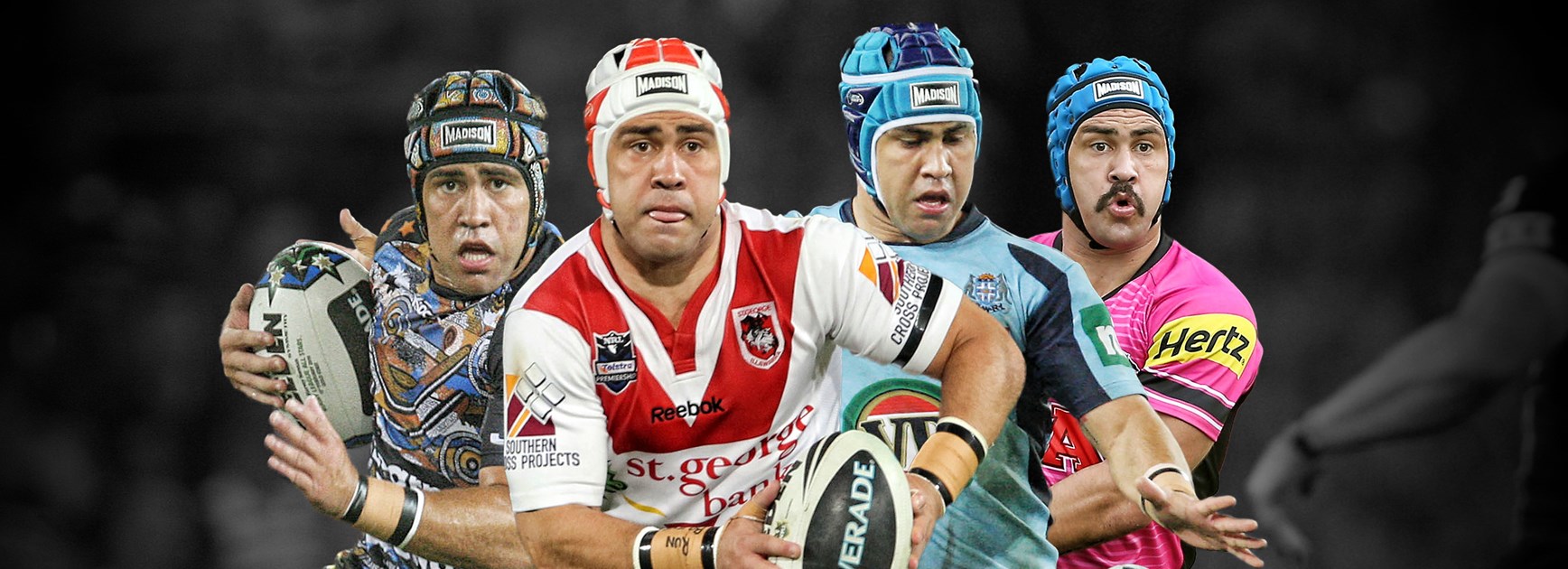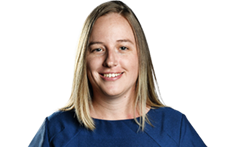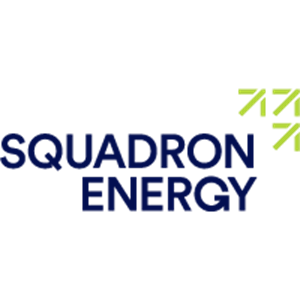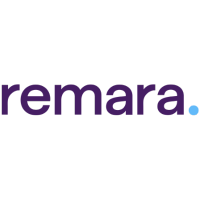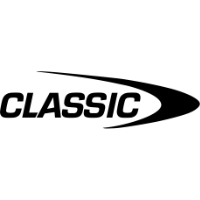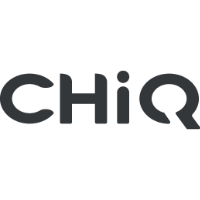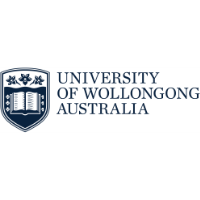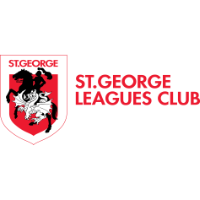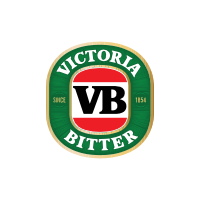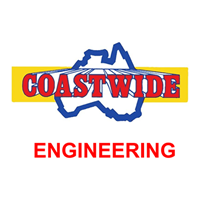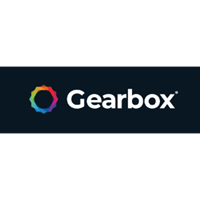Many supporters loved him, opposing fans usually felt otherwise, but Jamie Soward played 214 more games than he possibly ever imagined.
From overcoming family tragedy as a rookie to help guide St George Illawarra to their first premiership, Soward went through just about every high and low a professional player can experience during his career.
The former NSW Origin five-eighth, who these days is a columnist and analyst for NRL.com and several other media outlets as well as hosting his own podcast, takes a stroll down memory lane to relive his turbulent Telstra Premiership career.
Legend Q&A: Jamie Soward
Take us back to 2005, you dominated at Jersey Flegg level for the Roosters and then a few months later you were thrown into first grade – what do you remember about all that?
I moved from Canberra to Sydney in 2004 under Shane Flanagan for an opportunity. I had an undefeated season and the Roosters were coming towards the end of a decent run with three grand finals.
Brad Fittler just retired and the NRL roster was getting older. I made my debut against Newcastle, Phil Gould coached us all week with Ricky Stuart in Origin camp. We had a big win and it was surreal.
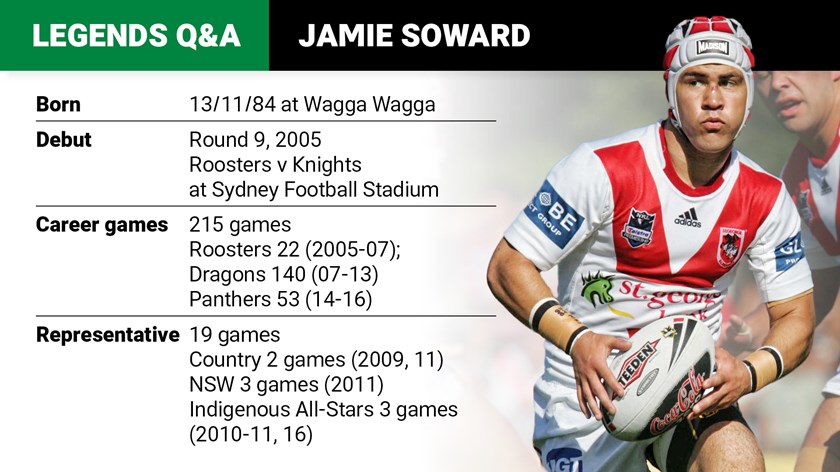
Unfortunately, the next morning at recovery I found out my dad had a heart attack and passed away. It was bittersweet because I'd worked hard to get to where I was, to have my world tipped upside down so quickly after what was one of greatest feelings only hours earlier, it was hard to take as a 20-year-old.
My relationship with my father wasn't as close as it should've or could've been so it was a weird time and it took me a while to get the bug back again with footy. I took a week off and didn't really talk to anyone, then took another week off and tried to get back into training but just couldn't do it.
What happened when you did get back to the Roosters?
I was in and out of first grade which still helped me playing reserve grade because I was developing my game against men. I couldn't really put it together on the field though when I did get a few more opportunities in first grade. It was a tough couple of years.
Is that what led you to the Dragons?
I was dropped to the Roosters' part-time squad in 2007. Chris Anderson didn't like certain parts of my game and wanted me to go back and play reserve grade.
I got fed up, had a coffee with Nathan Brown in Cronulla and we shook on an immediate move to the Dragons. I'm a handshake man, I didn't sign a contract my whole life until the pay date.
The next day I was back in first grade for the Roosters but had to tell Chris Anderson over the phone I was heading to the Dragons.
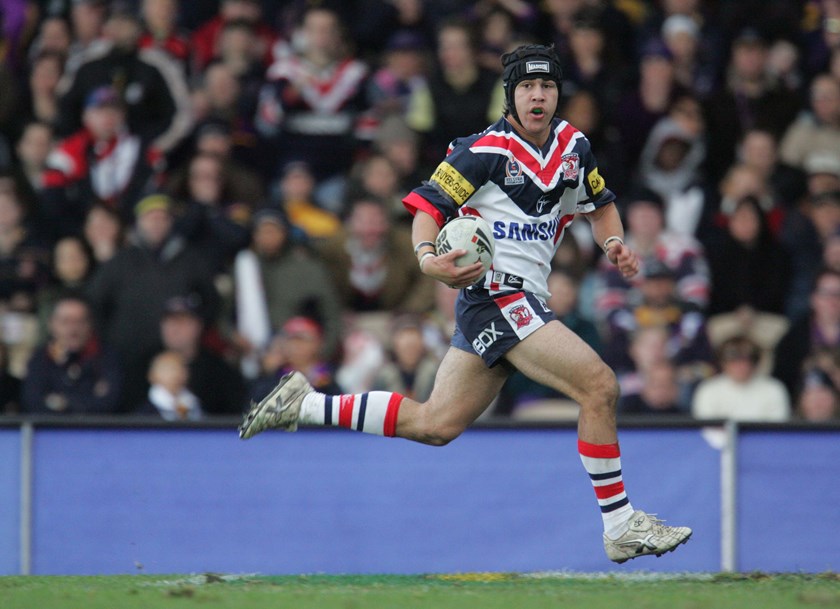
You ended up having some success against your former club after that...
You always want to beat your old club but I didn't really have anger towards them. Yes, I always wanted to beat them, I think I won my first five Anzac Day games against them and enjoyed it, but I was grateful for what they did for me too.
When I left the Dragons for Penrith it was different, I had a lot of anger and wanted to beat them badly because I felt like I built something there and felt I wasn't respected as much as I thought I deserved.
The Jamie Soward we saw on the paddock wasn't the biggest bloke and wore his heart on his sleeve, which also saw fans love to hate you. Did you feel that throughout your career?
It was what it was, I didn't really care about the opposition's fans or what people thought. I played my game on emotion. I wasn't a Johnathan Thurston or Andrew Johns where I could pick teams apart. I just competed and I thrived off that.
Guys like Michael Ennis and Josh Reynolds are in the same boat – not necessarily over-skilled guys but certainly competitiveness took them to that level.
Not everyone is going to be your biggest fan but I think as I've grown older and become more wiser I understand how to interact and socialise with people at certain times. That's gone a long way to people understanding I just wanted to win and we are taught to want to win from a young age and things happen, you say and do things on the field – whatever you can to win.
I've carried that my whole life and sometimes it works and sometimes it doesn’t. I'm glad social media platforms like Twitter weren't around back then though because I would've got myself in trouble whereas now I know how to manage it.
What about now you're working in the media post-footy, has your opinion or perception changed in any way or stayed the same?
I've always understood the media game but was a bit ahead of my time. I thought I deserved a lot more respect as a player when they seemed to pick me apart.
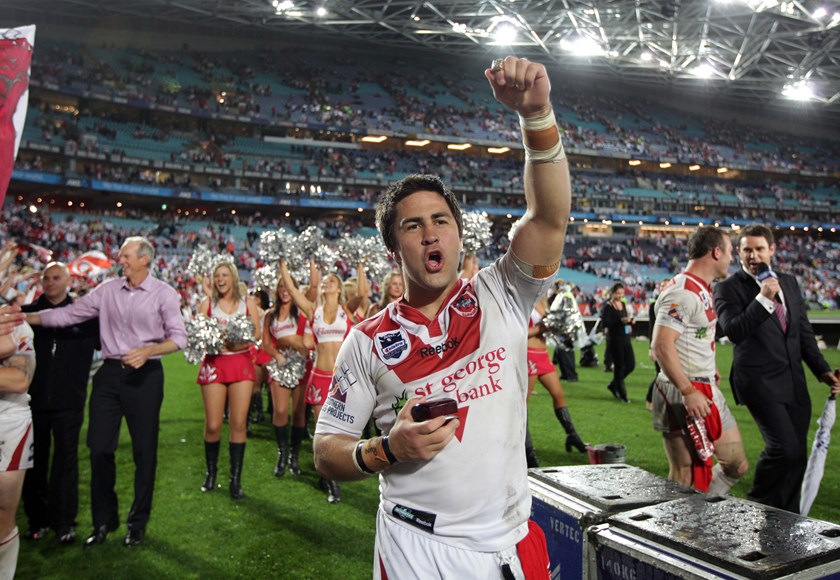
I felt like it was personal but working in the media now I can see how a player thinks that.
The perception has changed. There were times in the past the media would report on what they thought they knew happened off the field but now with mental health, kids, family and other personal issues, I think media are a lot more aware of that now.
There's still a gap I'd like to see close but there's a chance for the media and players to come together, especially with what's going on in the world at the moment.
How about your goal-kicking technique, it was unique – was it something you always did growing up?
I was shithouse growing up and my stepdad said to me in the exact words that if I wanted to move to Sydney I had to learn how to goal-kick because they'll take a halfback that can kick goals over one that can't.
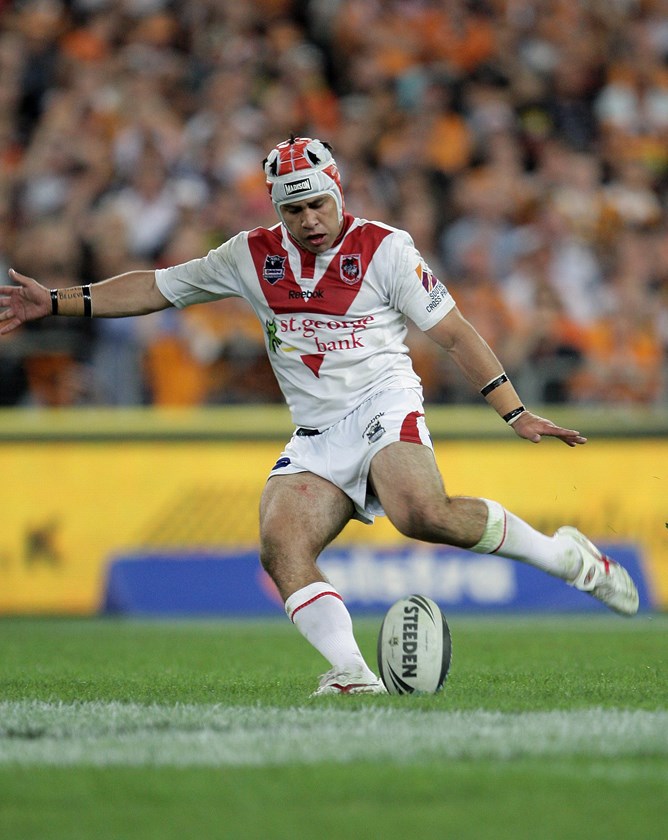
It changed when I went to the Dragons, I did a private session with former Socceroos coach Graham Arnold and he explained a few things.
I don't know where my routine came from after that but it opened a whole new world around angles. I kicked about 70-odd percent in my career so still not the best but it certainly improved after that session.
Wayne Bennett was among many mentors you had throughout your career – was there anyone else who had a really big influence?
When I look back I was lucky … I had Michael Maguire, Shane Flanagan, Ricky Stuart, Phil Gould – they'd all won premierships. Then you had Ivan Cleary and Anthony Griffin. Looking back they all had pros and cons.
Wayne got the most out of me by backing my ability. When a player gets that feeling from a coach you feel like you can go out and do anything. Towards the end of a career it's about player-coach fit.
Anthony and I probably didn't see eye-to-eye as player and coach. Maybe it left a sour taste in my mouth but working alongside each other for 2GB we can agree on almost everything. I'm glad that relationship has mended.
Who was the best teammate you played alongside and why?
I roomed with Johnathan Thurston with the Indigenous team and Greg Inglis but if you're talking out and out best in their position I would go with Brett Morris – I think he's the greatest winger ever. He was one of my best mates at the Dragons, has 160-odd tries and could run like the wind.
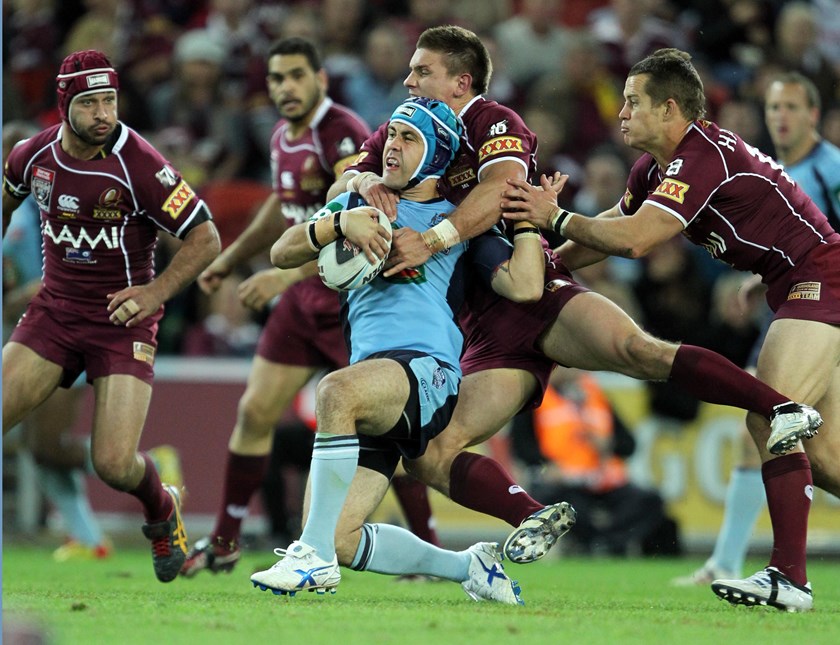
And what about the best you came up against?
When I made my debut against Queensland in 2011 I ran out for my first game at Suncorp Stadium and I was shitting myself. The game was on the line, it was 12-10 and I looked up and I watched the ball go from Cameron Smith to Johnathan Thurston to Darren Lockyer to Greg Inglis, who passed it inside to Billy Slater who then linked up with Cooper Cronk. You can take any one of those guys.
You've said previously in a column you're happier than you've ever been since retiring from the game – tell us why?
I had some personal issues with a past relationship and it took my focus off footy so the day I retired I remember looking at my wife Madi and it was like a weight had been lifted. We could start planning for the future.
I wish I met Madi 10 years ago. I'd like to dream as to where that might’ve taken me. I've been able to travel the world with my best friend, we've got a beautiful daughter Indiana and we're doing things now that doesn't come with any pressure.
The pressures that can come for players can make you really self-absorbed. I could enjoy going for a walk with the dogs whereas after a loss you might not see me anywhere but on a training paddock for two days. Once you have a child it even gets better.
She has no idea I ever played and may not care in the future but being able to spend time with people who love you for you is something that's way better than footy.
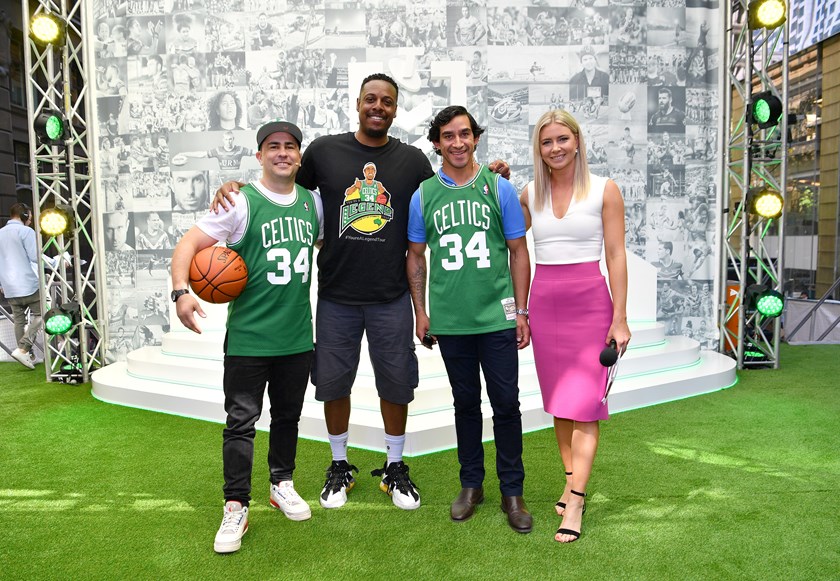
What else is keeping you busy these days?
Apart from my work in rugby league, I record a podcast every Tuesday night called Sweet and Soward. It's with myself and former AFL Swans player Nick Davis, where we talk about what's happening in Australian sport and try to culture others into American sport.
We've just started an isolation series where we catch up with former athletes from all codes and talk about the biggest moments of their careers and how they got there in that game rather than their whole life story. The world needs positive moments right now.
